Ah, the 1990s! The Soviet Union had been vanquished by the inexorable working of the invisible hand. A marvel of technology known as the World Wide Web connected people around the world who otherwise might never have met. In Canada, the US, and the UK, right centrist governments were replaced by parties perceived to be more left centrist. Despite occasional setbacks, history was manifestly ratcheting its way towards a golden age of universal liberal democracy. In retrospect, it’s easy to see why revered pundit Francis Fukuyama gave his 1992 book the title The End of History and the Last Man.1
This presented a challenge for SF writers. If society has reached its ultimate form, what is there to write about? As it turns out, quite a lot, as these ten works (one for each year of the decade!) prove.
Red Spider White Web by Misha (1990)
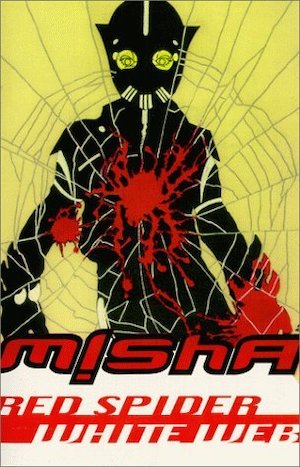
Among the influences on Indigenous SF author Misha was that phenomenon of the 1980s, cyberpunk. It’s predictable that Misha’s novel would take a decidedly pessimistic view of the near future. True, the gated city of Mickey-san offers its inhabitants paradise of a sort, but only the wealthy few qualify. The majority are consigned to the slums, to scrabble for survival amid the toxic rains. A few among the poor can survive by working for the rich. But artist Kumo is too principled to sell out to Mickey-san’s cosseted dreamers. The only real question is which deplorable fate she will suffer.
Misha offers some perspectives unusual in the SF of the time, which may explain why it is that this book, which as far as I know has received nothing but glowing reviews, has spent most of its existence out of print.
A Woman of the Iron People by Eleanor Arnason (1991)

Having repented of 20th-century sins, humanity took time from repairing the ravaged Earth to launch its first starship to nearby Sigma Draconis. Indigenous intelligent life comes as a surprise, one that forces a difficult decision on the well-meaning humans. The aliens appear to the humans to be trapped by biology in technological stagnation. Humans could help the alien progress past their current condition…but should they?
The book invests as much time in exploring the alien perspective as the human, from which it is clear the author does not share a certain failure of imagination with her human characters. The humans assume the aliens they meet are typical, that the aliens are not as various as humans. As it turns out, this is quite incorrect.
A Fire Upon the Deep by Vernor Vinge (1992)
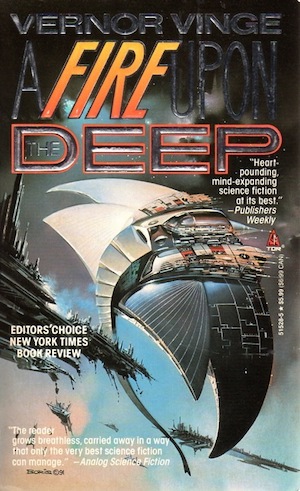
In a far distant future, ambitious archaeologists delve into an ancient, insufficiently documented software repository. Hoping for treasure, they release a technological demon instead. Ambition and greed may have doomed the galaxy…unless a countermeasure can be found in time.
When the near future seems likely to disappoint, resort to far-future settings. In Vinge’s case, his setting, in which computation and cognition are constrained by variations in space-time, is shaped by the need to avoid an entirely different end of history than Fukuyama’s—the impending singularity that would transform the world beyond human imagination.2
Cold Allies by Patricia Anthony (1993)
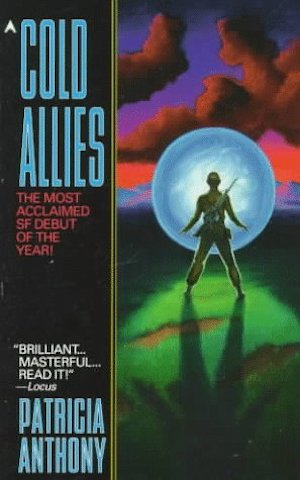
Climate change drove waves of desperate refugees from North Africa to Europe. Lacking a Martel or Sobieski, Europe enjoys a recapitulation of the 8th and 16th centuries. Neither the Americans nor Russians are willing to help in any meaningful way, which makes the unexpected appearance of aliens rather well timed. However, it’s not clear if the aliens are just there to offer aid or if they are playing some inscrutable game of their own.
Modern readers might find the premise implausible: despite facing catastrophe, humans are simply not willing to pull together. SF authors have to resort to these sort of impossibilities to gin up engaging plots…
Reluctant Voyagers by Élisabeth Vonarburg (1994)
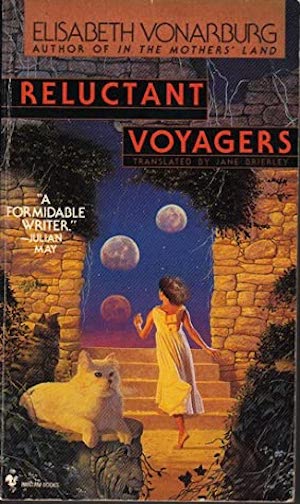
Setting: thanks to liberalization, Montreal’s small Francophone enclave is free to preserve its culture, provided it does not do so in a manner that irritates the Canadian National Police. Their anger is surprisingly easy to arouse.
Plot: faced with inexplicable anomalies, Catherine Rhymer delves into mysteries; the answers she finds are not answers to the questions she asked.
I will assume it was to underscore the novel’s themes of colonialist erasure and reshaping that the publisher of my copy of this work changed the author’s name from Élisabeth to Elizabeth.
Slow River by Nicola Griffith (1995)
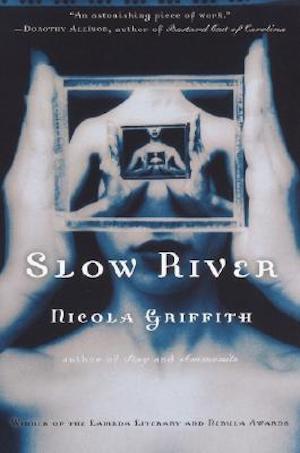
Left for dead by kidnappers, Lore van de Oest cuts all ties with her wealthy family and recreates herself as Sal Bird, Hedon Road wastewater treatment plant’s new junior employee. This is a fortuitous development for the thousands who depend on Hedon Road, as its manager’s ambitions far outweigh his actual expertise. Calamity looms. If “Sal Bird” were to use the skills she learned in her previous life to fix things, she might blow her cover. Not only that, saving Hedon Road might imperil the van de Oest revenue streams. She has turned her back on her family, but is she willing to betray them?
We all depend on a legion of unseen and little-regarded workers to maintain vital infrastructure. SF loves its transportation infrastructure…but sewers and water reclamation plants? Not so much. Griffith’s novel is one of very few (at least to my knowledge) that acknowledges that sort of infrastructure in a non-smirking way.
Making History by Stephen Fry (1996)

“Puppy” Young’s academic ambitions are kneecapped when his PhD advisor asserts that Puppy’s thesis concerning Hitler is largely nonsensical. At loose ends, Puppy is a natural ally for Nazi-loathing physicist Leo Zuckerman. Together, the pair set out to take their revenge on history. They succeed in rewriting it…for the worse.
Many protagonists would be wracked by guilt if their efforts led to the total extermination of Europe’s Jews, the atomic annihilation of Russian cities, the domination of Europe by the Nazis, and sweeping setbacks to civil liberties. Puppy is breathtakingly shallow and self-centered, so none of that bothers him…until he discovers that the new world order will personally affect him.
Revolutionary Girl Utena by Chiho Saito (19973)

Having been saved from drowning by a stranger known to her only as Licky-lick, Utena has focused on two goals: to be worthy of her savior and to somehow find him again. Clues point to the Ohtori Academy, which proves to be as eccentric as it is elite. Drawn into a game whose rules are obscure, the schoolgirl sees but one honorable alternative. Utena will protect the seemingly defenseless Rose Bride, Anthy Himemiya, by becoming a prince!
Readers looking for manga in which gender roles are clearly delineated into entirely traditional, exclusively heterosexual male and female categories would be very well advised to look elsewhere. Nothing in this dreamlike manga is as it seems at first glance; that emphatically applies to stock roles. The characters are as straight as the Mandelbrot set and everything is mutable.
The Dazzle of Day by Molly Gloss (1998)
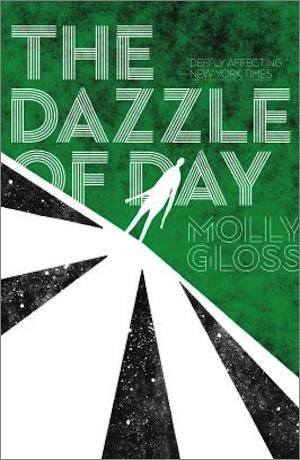
Frustrated with seemingly unreformable Earth, a community of Quakers repurposes an orbiting habitat and sets out for the stars. Will a tradition of community spirit and relentless reasonableness suffice to maintain the Dusty Miller on its 175-year journey? Or will the former space habitat, like virtually every other generation ship in science fiction history, fall victim to civil strife, barbarism, and death in the unforgiving depths of deepest space?
This is one of those novels where, having plumbed the very depths of companionable reasonableness, the characters somehow find new reserves of handling things like sensible adults. What the hell? What’s the point of community if not to turn on each other? Gloss’ novel is peculiar…in a Friendly way.
Down There in Darkness by George Turner (1999)
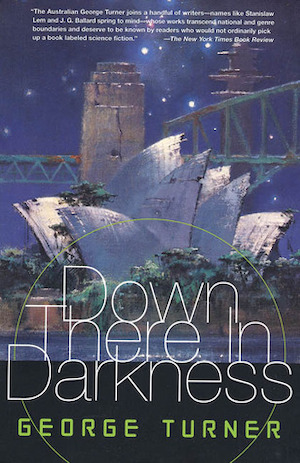
In an Australia slowly succumbing to the climate apocalypse, police detective Harry Ostrov is one of the lucky few still employed. Alas for Harry, his final assignment takes him too close to vital secrets. Consigned to a century of cold sleep, Harry wakes to witness just how far visionaries will go to save the Earth…provided said visionaries are utterly confident that they themselves will not have to pay the price.
Readers familiar with Turner’s oeuvre might expect pessimistic musing about human folly. That’s exactly what they will find between the covers of Down There in Darkness. On a more optimistic note, the fact that Turner managed to publish a novel in 1999 despite the notable disadvantage of having died in 1997 is the sort of example that authors with as yet unfinished series could take as an inspiration.
***
There were a lot of science fiction novels published in the 1990s—far too many to list. Still, don’t let that stop you from trying. Comments are, as ever, below.
Postscript: to be honest, the 1990s and the decades that followed may have deviated slightly from the sunny roadmaps presented to us by Fukuyama, Vinge, and others. Some younger people might find it very amusing that older persons were so far off the mark. To younger persons who believe themselves too well informed to make the same mistakes, let me offer these words of comfort from John Gardner’s heartwarming 1971 fantasy, Grendel:
“Poor Grendel’s had an accident,” I whisper. “So may you all.”
In the words of fanfiction author Musty181, four-time Hugo finalist, prolific book reviewer, and perennial Darwin Award nominee James Davis Nicoll “looks like a default mii with glasses.” His work has appeared in Interzone, Publishers Weekly and Romantic Times as well as on his own websites, James Nicoll Reviews (where he is assisted by editor Karen Lofstrom and web person Adrienne L. Travis) and the 2021 and 2022 Aurora Award finalist Young People Read Old SFF (where he is assisted by web person Adrienne L. Travis). His Patreon can be found here.
[1]Fukuyama’s title, The End of History and the Last Man, may seem sexist. But the discovery that women were people too was comparatively recent. Uptake of this discovery has since been sporadic and transient.
[2]Moore’s law (https://en.wikipedia.org/wiki/Moore%27s_law) will of course lead to the Singularity. Of course. When was the last time that exponential growth curves hit real-world limits?
[3]The year the first tankobon was published in Japan. Anglophones had to wait until 2002 for an authorized translation.










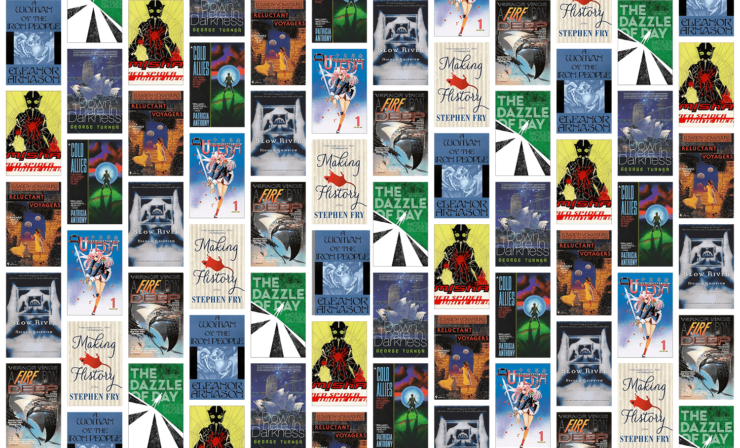
“John Gardner’s heartwarming 1971 fantasy, Grendel”
A librarian who knew of my liking for SFF recommended that to me. When I was 12. It was just a touch over my head..
@1 Likewise! But I did love that last line.
Strange how the greatest programmers of all are the ones whose work ends up in musty archives, just waiting to be discovered unleashed.
@1 & @2.
Me three! AND I think my librarian was a touch sadistic because she also gave me Ayn Rand’s Anthem, and a couple of early Heinlein. I think she wanted my head to explode
The Fortunate Fall, by Raphael Carter.
I thought about The Fortunate Fall but that’s not the name the author uses now and I was not sure how to tackle the issue.
When I saw the title of the article, I was thinking of all the dark and dreary tales set in an increasingly cold universe, lit only by a few lingering red stars. I am glad you went in a different direction. And A Fire Upon the Deep is one of my favoritest books ever, so I always love to see it mentioned.
I think we decided, or I did, that “that” edition of “Rogue Queen” by L. Sprague de Camp, which itself is outside the scope of the article, wasn’t maliciously printed as “Rouge Queen” (on the spine) by “L. Spraque de Camp” (front cover). It just happened.
Today I am apprised that capital letters in French that want an accent should have one, and where they don’t, it’s liable to be because either printing presses first, and typewriters later, didn’t allow it: although on the other hand it seems that some French speakers consider that accents on capitals are wrong. That is to say, the letter may be accented, but the accent symbol is invisible. I don’t know how to check this… except by putting accented text into the computer and then casting it to capitals, and that will only tell me about what the computer software happens to do.
@1 & @2, while not recommended to me, I did read it about that age, and I’m sure it went over my head too. I imagine I thought since it had a monster, there was no way to go wrong. It must have been laying around my (small) school’s library, along with Alas, Babylon and other such children’s books.
While Red Spider, White Web is out of print, I notice my library has “Walking the clouds : an anthology of indigenous science fiction” on order, which contains an excerpt from it. That book came out in 2012, and seems to still be in print, or at least it’s available for sale.
@6: I could say The Fortunate Fall by “Raphael Carter”, since that is the name on the cover. It should be reprinted, at least in e-book. It is such a great novel. If it comes out under a different author’s name, or the same name, whatever.
Someone needs to write a “5 SFF Books Inappropriately Recommended by Well Meaning Librarians or Other Adult “ article.
@11.






 I like this idea
I like this idea
I was also 12 when Interview with the Vampire was published. The original cover intrigued me so my babysitter loaned it me. Thinking back, she was stoned ALOT.
@11/all: For what it’s worth, James has an older article called “SF Books That Did Not Belong in the Children’s Section of the Library” that stems from similar thoughts :)
Meanwhile in USSR, dreams of generations for a better world were destroyed in a blink of an eye, promise of just reward for just effort (No matter if you gave your life to work or to army or to society you re were appreciated and rewarded) was replaced with Darwinism. After famine and constant crime it is hard to consider 90s as hopeful.
Equally it is the burst of Japanese economic bubble and loss of entire generation.
For the 90’s from other point of view consider :
Polyhand God Dalain by Loginov or early works by HL Oldie
“unless a countermeasure can be found in time.”
James.
“Meanwhile in USSR, dreams of generations for a better world were destroyed in a blink of an eye”
Half of the USSR, not to mention the Warsaw Pact, regained a freedom they had lost for decades. It wasn’t their dreams that got destroyed.
Robert Silverberg’s When We Went to See the End of the World should fit right in.
No world, no history.